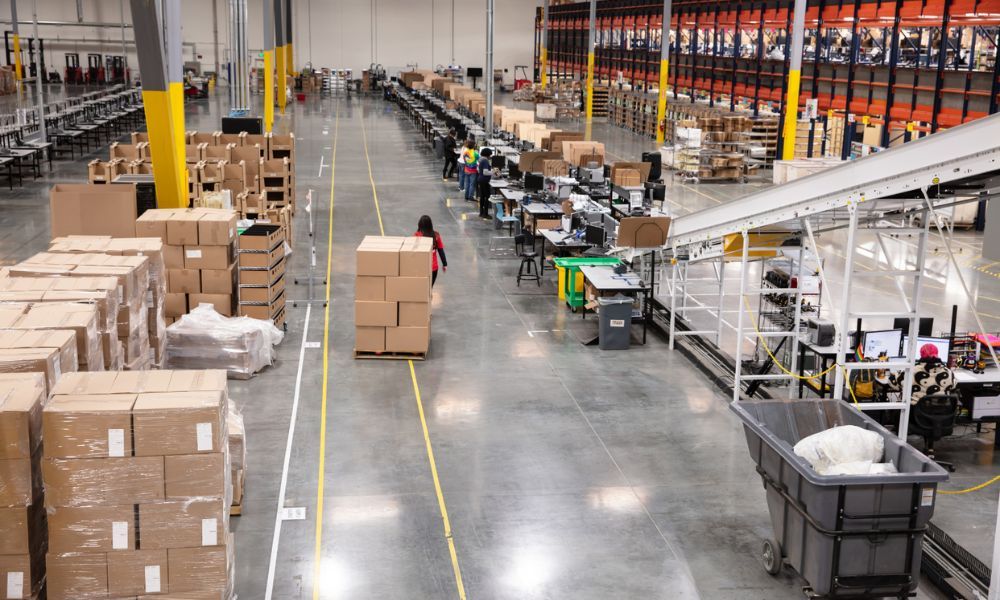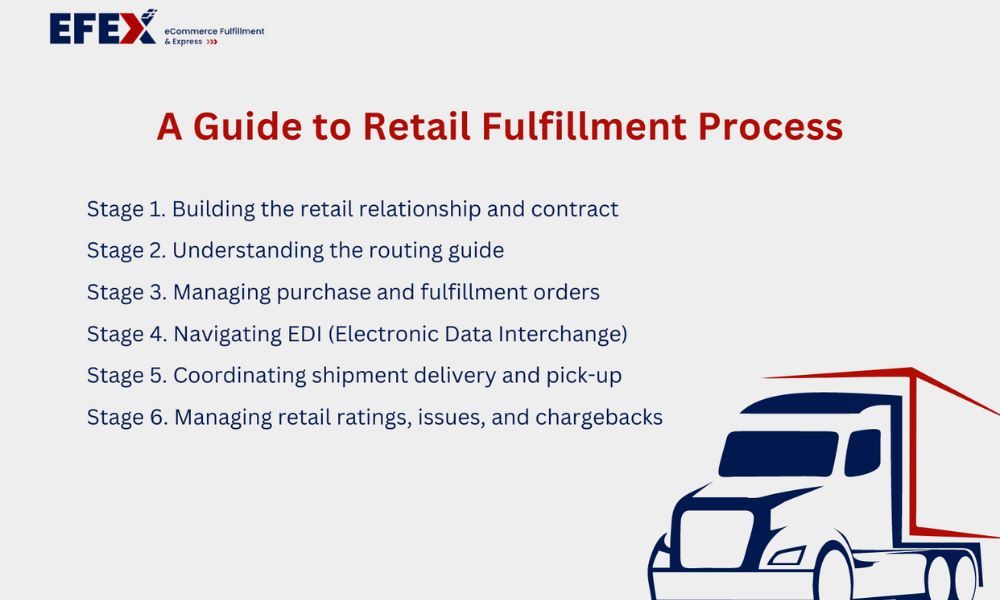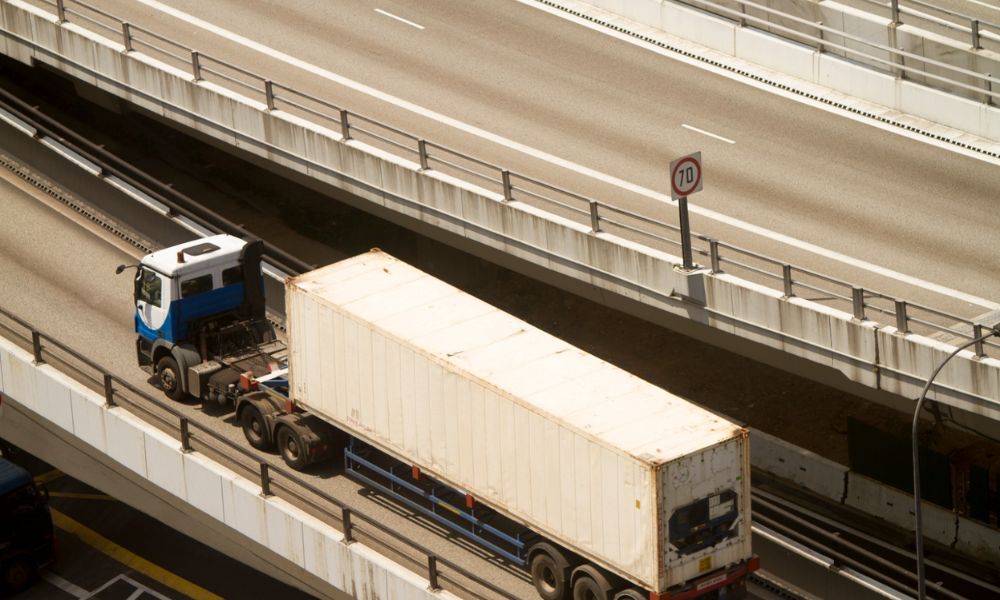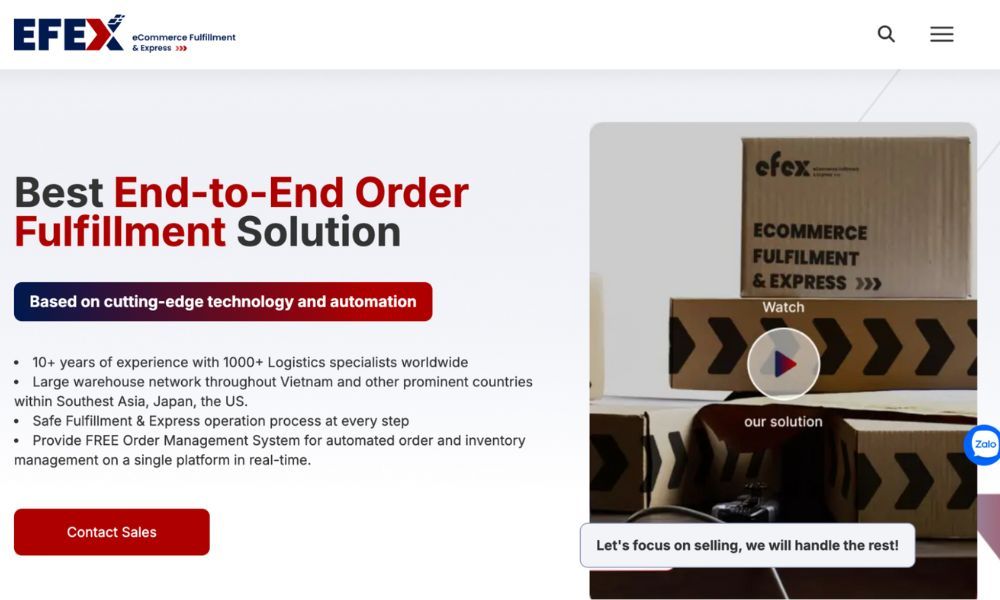
More Helpful Content
In both retail and B2B, effective fulfillment is the backbone of business success. Retail and B2B fulfillment may share common goals but require different approaches to meet unique demands. This article will break down the key differences and challenges and provide in-depth guides to help you optimize fulfillment and drive growth in each sector.
Retail and B2B Fulfillment - Key takeaways: ✅Retail and B2B fulfillment require different approaches—retail focuses on speed and customer convenience, while B2B emphasizes precision, customization, and managing long-term relationships. ✅B2B orders are large in quantity but infrequent, often placed in bulk every few months, whereas retail orders are smaller, more frequent, and delivered directly to individual consumers. ✅B2B orders are generally shipped via freight and palletized, while retail orders are usually sent through parcel delivery services optimized for speed and cost. |

Retail fulfillment is the end-to-end process of managing and delivering products to customers. It starts with receiving and processing orders from physical stores or online platforms. Additionally, managing inventory ensures that the right products are available when needed. Picking and packing involves selecting items from stock, preparing them for shipping, and getting them out the door. Shipping methods vary, and efficiently handling returns is crucial for customer satisfaction.
Overall, effective retail fulfillment enhances customer experiences and encourages repeat business. It also helps streamline operations, reduce costs, and adapt to evolving market trends, thereby giving businesses a competitive edge.

B2B (business-to-business) fulfillment involves managing and delivering orders between businesses rather than individual consumers. Unlike B2C orders, B2B orders are typically larger in quantity and may be placed in bulk every few months. These orders often involve multiple products, SKUs, or shipping destinations, making them more complex. Due to the large quantities, shipping usually involves freight and palletizing, while smaller orders may be delivered via parcel.
Effective B2B fulfillment requires robust inventory management and strategically placed warehouses to optimize supply chain efficiency and reduce costs. Building long-term relationships with business clients is necessary and often involves account managers and specialized returns management processes. Also, technology matters in B2B fulfillment by streamlining workflows and minimizing errors through advanced order management systems. Automation and integration help speed up order processing and improve overall efficiency.
To conclude, B2B fulfillment is essential for efficiently delivering bulk orders to businesses, maintaining strong customer relationships, and leveraging technology to enhance supply chain operations.
👉 B2B fulfillment is becoming trend for eCommerce, but first, the foundation is key. Check this out: B2B Fulfillment Guide: All things you need to know
| Retail Fulfillment | B2B Fulfillment | |
| Target audience | Direct-to-consumer (D2C) | Business-to-business (B2B) |
| Order size | Smaller, individual orders | Larger, bulk orders |
| Order frequency | High frequency, many transactions | Lower frequency, fewer transactions |
| Focus | Quick turnaround, customer satisfaction | Precise inventory management, adherence to contracts |
| Customization | Standard packaging, minimal customization | Customized packaging, labeling, and delivery requirements |
| Shipping methods | Parcel delivery (e.g., USPS, UPS, FedEx) | Freight shipping (e.g., palletized truckloads, LTL) |
| Logistic coordination | Simple, designed for speed and convenience | Complex, aligned with business schedules and supply chains |
| Customer relationship | Focus on customer service and experience | Emphasis on business relationships and ongoing communication |
The primary difference between retail and B2B fulfillment lies in their respective target audiences. Retail fulfillment focuses on delivering products directly to individual consumers who often seek quick, efficient service. This process involves managing numerous smaller orders that require immediate attention, ensuring customer satisfaction through timely deliveries and responsive customer service.
In contrast, B2B fulfillment serves businesses, delivering bulk orders to corporate clients, retail stores, or other commercial entities. These orders are typically larger in volume but fewer in number, and the relationships between businesses often involve more complex negotiations and ongoing communication.
Retail fulfillment typically handles smaller, more frequent orders, such as individual items purchased online. The focus here is on speed and accuracy, emphasizing meeting consumer expectations for quick turnaround times. For example, an eCommerce retailer might process hundreds of single-item orders daily, each needing to be picked, packed, and shipped promptly.
On the other hand, B2B order fulfillment deals with much larger orders, often requiring specialized handling and customized packaging. These orders might include thousands of product units, necessitating meticulous planning, precise inventory management, and adherence to specific contractual agreements with the business client.
Shipping methods also vary significantly between retail and B2B fulfillment. Retail fulfillment generally relies on parcel delivery services optimized for speed and convenience, such as USPS, UPS, or FedEx. These services are designed to deliver products directly to consumers' homes quickly and efficiently.
However, B2B fulfillment services often employ freight shipping methods, such as palletized truckloads or less-than-truckload (LTL) shipping, to handle the larger size and weight of business orders. The logistics in B2B fulfillment are more intricate, requiring careful coordination to align with business schedules and ensure that products arrive on time at their commercial destinations.
In retail fulfillment, processes are often standardized, with little need for customization. For instance, packaging and labeling are usually uniform across all products, focusing on efficiency and consistency. However, B2B fulfillment often demands higher levels of customization and flexibility to meet the specific needs of business clients. Besides, a B2B client might require unique packaging, custom labeling, or specific delivery schedules tailored to their operational requirements. This level of customization adds complexity to the fulfillment process, requiring businesses to be adaptable and responsive to the varying demands of their B2B customers.
Finally, the nature of the customer relationship differs significantly. In retail fulfillment, the relationship is typically transactional, focusing on providing a seamless customer experience through efficient service and responsive customer support.
Conversely, B2B fulfillment involves more profound, more strategic relationships between businesses. These relationships are built on trust and ongoing communication and often involve long-term contracts. Maintaining strong B2B relationships requires meeting delivery expectations and providing consistent, reliable service that aligns with the business client's broader operational goals.
Retail fulfillment services are intricate and require careful coordination to ensure products reach stores efficiently and according to retailer specifications. Each retail partner has unique requirements, making it crucial for brands to be organized and adaptable to meet these demands.

Securing an account with a retailer is a significant achievement and a process that demands effort, connections, and strategic networking. Before diving into a new retail channel, evaluating product-market fit is essential. Will the store’s customers be interested in your product? Additionally, consider your capacity for growth—can your retail order fulfillment operations scale if the retailer expands your presence in their stores? These considerations are vital in forming a sustainable partnership.
Once you’ve secured a retail account, the next step involves understanding the retailer’s routing guide—a detailed set of instructions dictating how your products should be delivered to their locations. The requirements might be less formal but still crucial for smaller retailers like boutique shops. They might specify packaging details, such as the number of units per case, but these are typically decided in collaboration with the merchant and their marketing team.
With the routing guide in hand, your focus shifts to fulfilling orders according to the retailer's specifications. Getting the details right is critical if your fulfillment is handled in-house or by a third-party logistics provider (3PL). It’s common to test orders to ensure accuracy before fully launching your products in stores. As your retail presence grows, managing these orders becomes more complex, often necessitating a dedicated operations team to handle the intricate details of retail and B2B fulfillment.
Effective communication is critical during this phase. Your team, the retailer’s team, and any third-party providers must coordinate seamlessly to ensure that products are packaged, labeled, and delivered correctly. Real-time updates and accurate information exchange are crucial for maintaining smooth operations.
EDI plays a pivotal role in retail fulfillment services by streamlining the exchange of purchase orders and shipment information between you and the retailer. While most retailers use EDI, some might employ other systems, each with its own specific instructions. Setting up a new EDI connection requires careful coordination between all parties and can be lengthy. Partnering with a 3PL experienced in retail order fulfillment can ease this transition, ensuring that communication flows smoothly.
Transportation is a critical aspect of retail and B2B fulfillment. Retailers often have strict guidelines for how and when products should be delivered to their stores or distribution hubs. The routing guide will outline these requirements, including specific delivery time slots. Some retailers prefer to manage transportation themselves, picking up products directly from your facility or distribution center. Adhering to labeling and packing specifications and ensuring timely readiness for pickup is crucial for avoiding delays and maintaining good standing with the retailer.
Retailers closely monitor your performance in retail fulfillment and may penalize non-compliance with their requirements. These penalties, known as chargebacks, can result from missing delivery windows, mislabeling products, or sending incorrect quantities. Chargebacks can be costly, especially with large retailers like Amazon or Target, where penalties can accumulate quickly. Some retailers may be more lenient, especially with first-time offenses, but maintaining a good relationship and understanding the retailer’s chargeback policies is essential.
Partnering with a third-party logistics (3PL) provider can significantly enhance your business operations. Here are several compelling reasons why you should consider utilizing 3PL services:

3PLs can lower your cost per order by leveraging economies of scale. They aggregate the logistics needs of multiple clients, allowing for shared resources and reduced expenses on warehousing, transportation, and technology investments. By outsourcing logistics, businesses can also avoid significant capital expenditures on warehouses, equipment, and technology, enabling companies to allocate resources more effectively toward core business functions rather than logistics infrastructure. This is particularly beneficial for both B2B and B2C fulfillment operations.
3PL providers often have extensive experience and specialization in various industries, which can help businesses navigate complex logistics challenges. Their expertise brings valuable insights that can optimize supply chain operations, whether you’re focused on retail order fulfillment or B2B fulfillment. Moreover, many 3PLs invest in cutting-edge technology such as warehouse management systems (WMS), automated sorting, and inventory tracking systems. This technology streamlines operations and provides real-time visibility into inventory and order statuses, enhancing decision-making capabilities.
As your business expands, a 3PL can quickly scale its services to accommodate increased order volumes without the need for you to invest in additional infrastructure. This flexibility is crucial during peak seasons or unexpected surges in demand. Plus, 3PLs can quickly adjust to market or consumer demand changes, helping businesses remain agile and competitive. This includes managing seasonal fluctuations and providing reverse logistics for returns.
With optimized logistics processes, 3PLs can enhance order fulfillment speeds, leading to improved customer satisfaction. Efficient logistics handling translates to quicker delivery times and better overall service. By outsourcing logistics, businesses can also concentrate on their core competencies, such as product development and marketing, rather than getting bogged down by supply chain management.
Many 3PL providers have extensive networks of distribution centers, helping businesses reach customers more effectively. This is particularly beneficial for eCommerce companies looking to offer faster shipping options. Additionally, 3PLs can support various sales channels, including online marketplaces and brick-and-mortar stores, facilitating seamless logistics integration across different platforms.
Choosing EFEX means benefiting from significant cost savings, fast order processing, and optimized operations. Our commitment to excellence and comprehensive solutions make us a trusted partner for businesses seeking to enhance their fulfillment processes.

Retail fulfillment is a critical aspect of the retail supply chain that involves managing the entire process from order receipt to delivery. A well-optimized fulfillment operation can provide a competitive advantage by improving customer satisfaction, enhancing operational efficiency, and ultimately driving sales growth. As eCommerce continues to grow, effective retail fulfillment becomes increasingly vital for retailers seeking to succeed in a competitive marketplace.
B2B fulfillment manages returns and reverses logistics through specialized processes that include RMAs, thorough inspections, inventory management adjustments, data analysis, and technology integration. These practices ensure that returns are handled efficiently, minimizing costs and enhancing customer satisfaction while maintaining accurate inventory levels.
Both retail and B2B fulfillment aim to deliver products efficiently; retail fulfillment faces unique challenges in managing high-volume, smaller orders, attractive packaging, dynamic inventory, and consumer-focused shipping and returns. B2B fulfillment, on the other hand, deals with fewer but larger orders, complex inventory management, and relationship-based customer service.
SLAs for retail and B2B fulfillment differ due to their distinct operational needs.
Retail Fulfillment SLAs typically target 95% to 99% on-time delivery and 98% order accuracy. They aim to ship 95% of orders received by 12 PM the same day and process returns with a goal of 97% within two business days.
Due to the complexity of bulk orders, B2B Fulfillment SLAs usually have slightly lower on-time delivery targets of 90% to 95%. They also require around 98% order accuracy and generally allow 24 to 48 hours for shipping. B2B SLAs often include inventory accuracy metrics of at least 98%.
In conclusion, retail and B2B fulfillment SLAs differ significantly. Retail focuses on high on-time delivery rates and fast processing times to meet consumer needs, while B2B emphasizes managing bulk orders and maintaining inventory accuracy with slightly longer shipping windows. Understanding these differences helps businesses optimize their supply chain operations.
Partnering with a reliable fulfillment service is crucial to navigating these complexities effectively. EFEX Fulfillment Services excels in both retail and B2B fulfillment, offering top-notch accuracy, timely delivery, and advanced technology. Their expertise ensures streamlined operations, cost reduction, and enhanced efficiency. By choosing Efex, businesses can align their fulfillment strategies with their goals and meet customer expectations more effectively.


